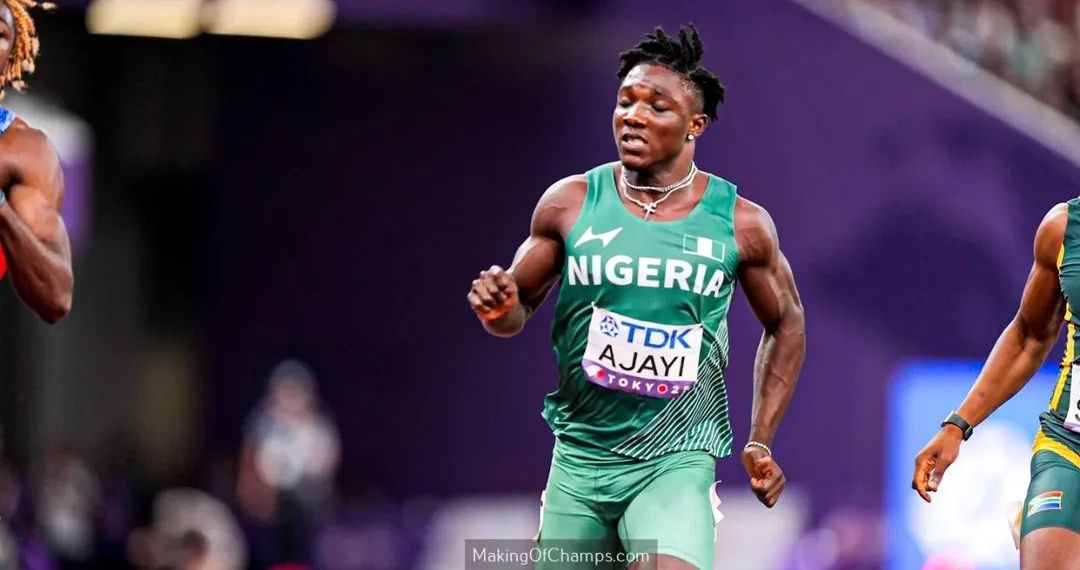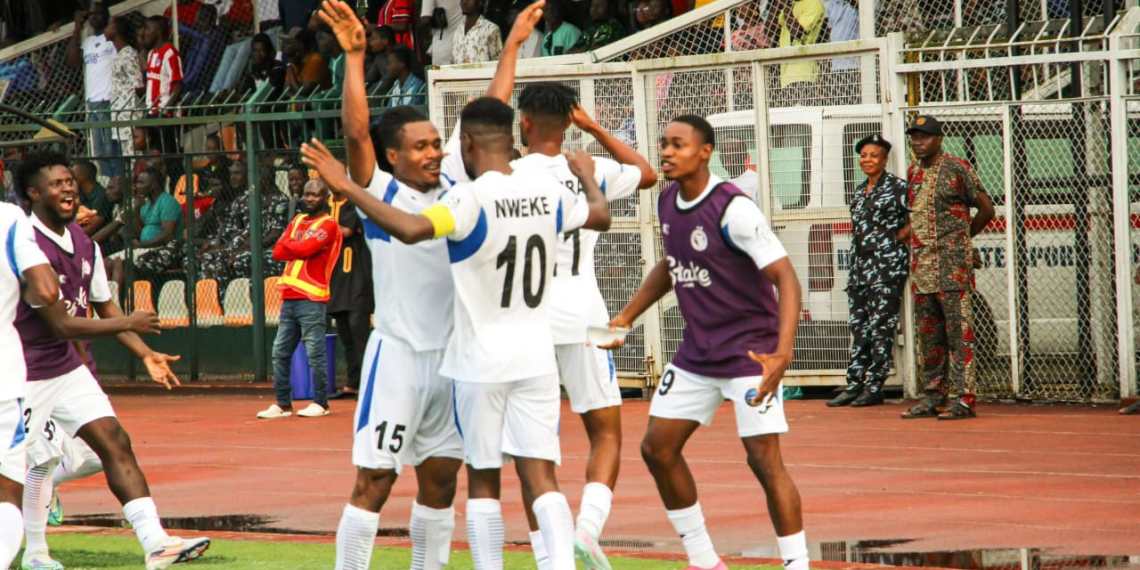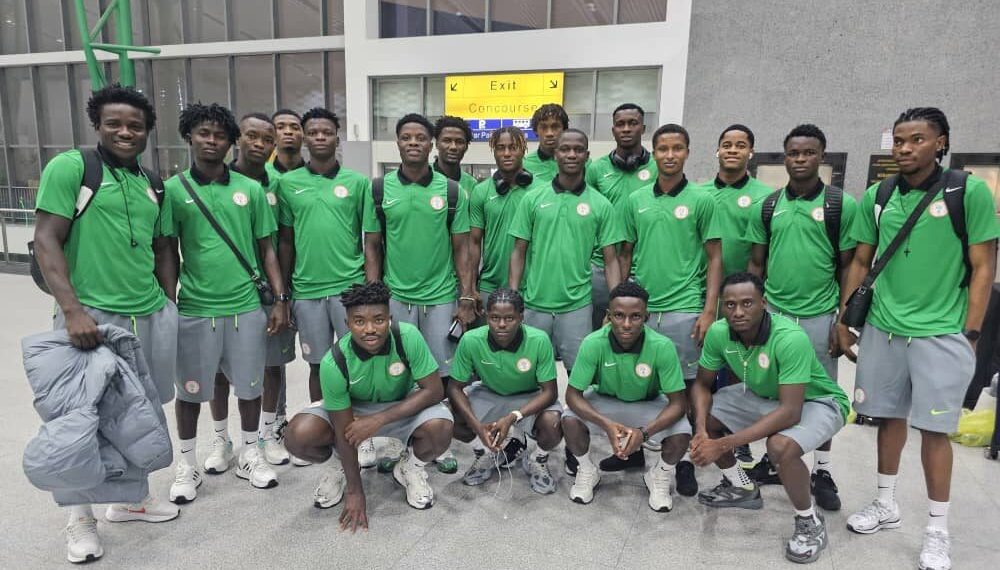In a moment that electrified Nigerian sports fans and set viewing centers buzzing from Lagos to Kano, 20-year-old Kanyinsola Ajayi has secured his place among the country’s sprint legends. On Sunday, Ajayi became the first Nigerian man in nearly two decades to qualify for the final of the men’s 100 metres at the World Athletics Championships—a feat last achieved by Olusoji Fasuba in 2007. His blistering 9.93-second finish in the semifinals not only marks a personal breakthrough but rekindles hopes of seeing the green-and-white flag atop the global sprinting stage once again.
Ajayi’s Run: Nerves, Glory, and a New Generation
Drawn into a tough first semifinal heat stacked with Olympic and world champions, Ajayi faced down American defending champion Noah Lyles, Italy’s Olympic gold medalist Marcell Lamont Jacobs, and South Africa’s sprint mainstay Akani Simbine. The Nigerian sprinter was undaunted, displaying remarkable focus and explosive acceleration over the last 30 metres. Crossing in second place, he claimed an automatic spot in the final and the admiration of millions watching across Nigeria, Ghana, and the wider African continent.
“We have waited so long to see a Nigerian in this position again,” said Lagos-based athletics journalist Ayo Osho. “Ajayi runs with the heart and confidence of a new generation, and he’s inspiring young athletes at home.”
Rekindling Memories of Fasuba
Ajayi’s remarkable achievement echoes memories of Olusoji Fasuba, who left a lasting mark in Osaka’s 2007 final by finishing a nail-biting fourth. Fasuba’s national record of 9.85 seconds still stands, but Ajayi’s recent performances suggest that time may not last much longer; earlier this season in Tokyo, the youngster blazed to a lifetime best of 9.88 seconds. Athletics enthusiasts across West Africa are watching eagerly to see if a new record—and perhaps a global medal—are within reach.
Building on a Clash of Continents
This year’s men’s 100m final reflects a fresh era for African sprinting. Alongside Ajayi, South Africa’s Gift Leotlela and Akani Simbine, and Botswana’s Letsile Tebogo, will compete against two Americans (Noah Lyles and Kenneth Bednarek) and two Jamaicans (Kishane Thompson and Oblique Seville). This near-even continental split highlights Africa’s growing prominence in what has traditionally been a North American and Caribbean stronghold event.
Sports analyst Sara Bello told NowahalaZone, “The resurgence of African sprinters on the world stage is no accident; there are deeper investments and grassroots programs across Nigeria, Ghana, Botswana, and South Africa. Ajayi is just the latest symbol of Africa’s sprint renaissance.”
Nigerian Road to Tokyo: Hurdles, Setbacks, and Breakouts
Ajayi’s path to stardom has been marked by grit and relentless work. Once a star at Nigeria’s national youth meets and West African school competitions, his leap to senior level was not guaranteed. Injury setbacks, competition for funding, and the challenge of breaking into Europe and Asia’s top races often derail even the brightest prospects.
- Training Challenges: Access to quality tracks and coaching remains inconsistent in Nigeria, making Ajayi’s rise all the more impressive.
- Sub-10 Second Consistency: He is among the first of a new Nigerian cohort regularly clocking times under 10 seconds—a barrier that’s psychological as much as physical for many African sprinters.
- Role Model Effect: His journey is inspiring upcoming runners in Lagos, Abuja, and even grassroots hubs in Benin and Accra.
Local Impact and Fans: From Grassroots to Giant Screens
The impact of Ajayi’s historic run is felt far beyond the stadium in Tokyo. In sports bars, university hostels, and neighbourhood fields, Nigerian youth are glued to their screens. Social media platforms are overflowing with #Ajayi100mFinal posts, with prominent voices like Tobi Amusan and Blessing Okagbare cheering him on. For fans, Ajayi embodies hope—a reminder that Nigeria’s name still echoes in the world’s most competitive athletic circles.
“His success isn’t just for himself—it rekindles community pride and national ambition,” said Abiola Kazeem, a coach in Abeokuta who mentors young sprinters.
Looking to the Final: Can History Be Made?
With Sunday’s final looming under the dazzling lights of the Japan National Stadium, the question on every Nigerian’s lips is simple: Can Ajayi go even further than Fasuba and claim a medal? While the field is fierce, experts highlight Ajayi’s current form, fast reaction times, and finishing surge as key strengths. Regardless of the outcome, his place in Nigerian athletics lore is already assured.
Not All Smooth Sailing: Nigeria’s Wider 100m Hopes
While Ajayi’s success sparks celebration, it was a mixed day for the Nigerian camp. Fellow sprinter Israel Okon, who also made it to the semifinals, finished seventh with a time of 10.14 seconds—falling short of a finals berth. His story is a reminder of the fierce global competition and the margins that separate triumph from near-miss.
Yet, moments like this can serve as turning points for national sporting authorities, highlighting the need for deeper investment in training, sports science, and athlete support systems. As Okon himself posted on X, “Not the result I wanted, but grateful for the opportunity. More work to do. Thank you, Nigeria.”
How Global Trends Shape Local Dreams
The international stage is evolving, with more African nations investing in sprint programs. According to World Athletics statistics, the number of sub-10 runners from Africa has doubled in the past five years. Ghana, Cote d’Ivoire, and Ethiopia are building rival sprint teams, creating friendly regional rivalries that further motivate athletes like Ajayi and Tebogo.
For many Nigerians, Ajayi’s achievement goes beyond sport—it’s about national identity, showing what’s possible when raw talent meets opportunity. His advancement to the final is a loud call for continued support not just for athletes, but for the wider sporting ecosystem.
What Next for Ajayi—and for Nigerian Athletics?
As anticipation builds for the final, attention will turn to how Ajayi manages the pressure of international expectations. A podium finish could reshape the narrative for Nigerian sprinting, inspire new funding, and have a ripple effect on school and youth athletics. Even without a medal, Ajayi’s breakthrough signals hope for a new era and a future where Nigerians and West Africans dream—and deliver—on a global scale.
What do you think? Will Ajayi break the medal drought and inspire a new crop of young African sprinters? Let us know your opinion in the comments, and follow us for full coverage of the World Athletics Championships!
Do you have a sports story, inspirational local hero, or unique perspective on Nigerian or African athletics? Want to get your story published or sell it? Reach out today!
- Email us at story@nowahalazone.com to share or sell your experiences—whether you’re a current athlete, coach, or devoted fan.
- For general support, questions, or to suggest new topics, write to support@nowahalazone.com.
- Stay inspired and join the community! Follow us on Facebook, X (Twitter), and Instagram for the latest in sports and more.
We welcome all voices—share your thoughts in the comments, and let’s celebrate African sports excellence together!










